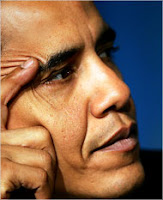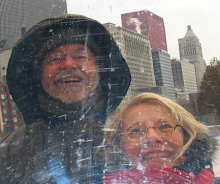
I'm an old white guy -- well, not OLD old, but I was 28 when Martin Luther King was assassinated. Old enough to remember serious arguments in college about equal rights. Some guy would always try to end the conversation by saying "Yes, but would you want your daughter to marry one?"
And now "one" is president!
Black kids were a very small minority at East Bakersfield High School, perhaps 5%, and "we" didn't socialize with "them" much. I never forgave Clevell Nichols for being (1) several inches shorter than me and (2) able to outjump me by several inches. White man's disease kept me from being first string center on the freshman basketball team, the Dirks. (OK, I couldn't shoot or dribble, either, so I wasn't even second string...) We had a few weeks of boxing in PE, and they paired us up with kids our own size when we sparred and when we did the mandatory one or two minutes in the ring. Troy Young was tall and skinny like me, but I was no fighter and no match for him. He was a very gentle soul, but he wasn't going to settle for a bad performance in the ring, so he tagged me a few times. I can still hear him saying after each punch landed, barely louder than a whisper, "Sorry, Steve!"
I remember the astonishment I felt one spring day at Cal when a beautiful black girl smiled at me. I wasn't astonished because she smiled, but because I thought she was beautiful. How blind I'd been...

Yes, Mr. President, your wife is indeed beautiful!
My generation would like to claim credit for the civil rights movement, but it was really my parents' generation that did it. Although Dr. King was only eleven years older than me, he was one of the younger ones. Rosa Parks was born the same year as my mother, and Joseph Lowery, who gave the closing prayer at the inauguration, was only eight years younger. Roy Wilkins was born in 1901, Thurgood Marshall in 1908, the same year as the most significant white civil rights leader, Lyndon Johnson.
Many whites of my parents' generation accepted separate but unequal, but they also had a disturbing sense that something was unfair about this. My generation had the same schizophrenic view, but the balance between acceptance of the status quo vs. the sense of unfairness was tilted toward the latter. This wasn't our doing, but the legacy of our parents' attitudes.
M & I attended the dedication of the Birmingham Civil Rights Institute in 1992. (I later told my folks that I would have never dreamed that I'd end up in Birmingham, singing "We Shall Overcome" in the 16th Street Baptist Church!)
In the Church after the dedication, Andrew Young told how, on the last day of the Birmingham protests, he first came to believe that the movement would actually succeed. Dr. King was in jail, along with several of the other leaders. The protesters gathered at the 16th St. Baptist Church, and Young was to lead their march to the jail, where they would pray, then disperse. Of course, they didn't have a permit. As they crossed Kelly Ingram Park, they came face-to-face with Bull Conner, who informed them that they couldn't proceed. Behind him stood armed police, along with Birmingham firemen manning hoses attached to huge nozzles mounted on tripods. Young, who described himself as not a courageous man, decided that it was too dangerous to continue, and that they should turn back.
He turned around to tell the marchers that they couldn't go on. He told us that, before he could speak, he saw the only thing scarier than armed policemen and fire hoses: hundreds of middle-aged and elderly black women, down on their knees praying.
Giving in to the less frightening path, he turned back around and started to walk forward. He was convinced that someone -- perhaps him -- was going to be killed. Then, he told us, his eyes met those of a white fireman. The huge nozzle, pointed right at him, dropped down just a few degrees. He realized that the white man was ashamed of what he was doing. That most whites were probably ashamed. In that moment, he began to believe that they would win.
And we all did.
Maureen Dowd had a wonderful column right after the election about white people all across the country asking black strangers how they felt about the election. She overheard a white man in a restaurant asking a black waitress if she had cried when she heard about Obama's victory. "She said she did, and he said he wept like a baby."
On election day, Marie and I had lunch at the Silver Diner Cafe, and I told the black cashier that I never thought I'd see an election like this one. She was perhaps a few years younger than me, and of course she agreed. I didn't know I was a stereotype headed for the NYT editorial page. Watching the returns that night just down the road from Hambidge, I didn't weep, but my eyes kept dripping all night. Talking alone with Marie, and in private, I have cried several times since. At Cathy and Don's, watching the inauguration while sipping Obamaramas, my eyes, like my heart, were again running over.
My country, 'tis of thee! Sweet, sweet, sweet land -- finally -- of liberty!!

No comments:
Post a Comment